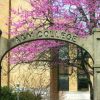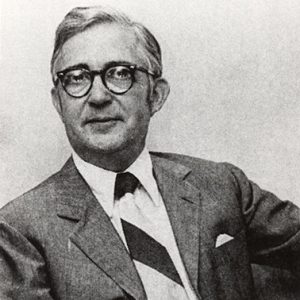calsfoundation@cals.org
Thomas Cary Duncan Eaves (1918–1986)
Thomas Cary Duncan Eaves taught in the English Department at the University of Arkansas (UA) in Fayetteville (Washington County) for thirty-seven years, ultimately being named a UA University Professor. Along with fellow UA professor Ben Drew Kimpel, Eaves wrote the definitive biography of eighteenth-century novelist Samuel Richardson; they also published numerous articles on Richardson and the works of twentieth-century poet Ezra Pound. Highly regarded as a scholar, Eaves was also renowned for the liveliness of his lectures and was a favorite among students in his department.
Born in Union, South Carolina, on October 11, 1918, Duncan Eaves (who published under the name T. C. Duncan Eaves) was the only child of Donald Matheson Eaves and Louisa Duncan Eaves. He attended Union’s public schools, where he showed precocious ability in art—giving a one-man exhibition in his teens—and developed a love for movies.
After a year at the Citadel, Eaves received his bachelor’s degree with honors in 1939, Phi Beta Kappa, from the University of North Carolina. He earned a master’s degree from the University of Cincinnati (1940), as well as a master’s (1943) and PhD (1944) from Harvard University. After teaching at Rutgers University (1944–1946) and the College of William and Mary (1946–1947), he took an advertising job in New York but had to resign due to illness. In 1949, he joined the English Department at UA, where he became a full professor in 1957.
His first major academic project, which began as he was convalescing in 1948, was to collect, organize, edit, and annotate the voluminous letters of southern author and historian William Gilmore Simms. Eaves produced five volumes of Simms’s correspondence between 1952 and 1956 and a sixth in 1982. The collection surveys the American literary and political scene from the perspective of an important southern writer in the antebellum period.
Eaves also began a collaboration with his friend Dr. Ben Kimpel, a native of Arkansas and classmate at the University of North Carolina. For years, Kimpel, who began teaching in the English Department at UA in 1952, met with Eaves each night, and the two talked about literature and smoked heavily. Kimpel helped Eaves edit the Simms letters, and together they produced The Informal Reader, a college anthology, in 1955, followed by a translation of Goethe’s play Torquato Tasso in 1956. The major product of their partnership, fifteen years in the making, was Samuel Richardson, A Biography (Oxford: Clarendon Press, 1971). After a half century, Samuel Richardson remains the definitive biography of the first English novelist. They also edited a 1971 edition of Richardson’s novel Pamela and published dozens of related articles. Although they published twenty-three articles on the topic, neither Eaves nor Kimpel lived long enough to finish their ten-year research effort to produce a line-by-line explication of Ezra Pound’s poem The Cantos.
With a love for factual, historical scholarship, Eaves dismissed emerging literary interpretive theories as “another flight of fancy.” His scholarship led him to receiving multiple grants, including a Guggenheim in England and a Fulbright in Italy.
Perhaps Eaves’s greatest impact in his thirty-seven years at UA was as a teacher. His erudition, expressed through the personality of a raconteur, made him a class favorite. He loved to tell anecdotes—bawdy and otherwise—to make eighteenth-century literature come to life. He would lean back in his chair, feet on the desk, puffing on a cigarette, and speak as if he had just been struck by a fascinating thought, although his lectures were always in fact carefully prepared beforehand. Eaves would mournfully recite Thomas Gray’s “Elegy Written in a Country Churchyard” or playfully rattle off long stretches of Alexander Pope’s satiric heroic couplets, challenging students to join him in “The Rape of the Lock.” Through good humor alone, he could convince students to persevere through Richardson’s long novels Pamela or Clarissa.
Eaves won UA’s Alumni Award for Research in 1969. In 1984, he was named a University Professor, a title that the UA reserves “for only the very best faculty at the U of A in recognition of sustained excellence in the performance of their duties.”
Eaves and his wife, Juliet Caruana Eaves, had three daughters: Frances, Louisa, and Caroline. The Eaves family often entertained fellow teachers and students at dinner parties that ran well into the night, with Eaves holding forth on multiple subjects. Eaves’s daughters recounted that their father also sought to teach “proper manners” to their boyfriends.
Eaves was still teaching at the time of his death, from an inoperable aneurysm, on April 4, 1986. Eaves and his wife (who died in 2012) are buried in his hometown of Union.
For additional information:
“Professor at U of A Dies at Age 68.” Arkansas Gazette, April 5, 1986, p. 10A.
Rudolph, Leighton. “Thomas Cary Duncan Eaves: A Biographical Sketch.” In The Long Years of Neglect: The Work and Reputation of William Gilmore Simms, Appendix A. Fayetteville: University of Arkansas Press, 1989.
Collins Hemingway
Bend, Oregon








Comments
No comments on this entry yet.